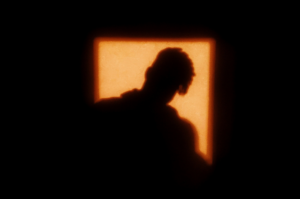
I.
Here he is, the man you thought was fully yours. He’s wearing a Man U jersey and ripped jeans, wearing a smile you’ve never seen on him before. But he’s here to pick up his things and leave. Because leaving you is the only way he can genuinely love you.
You’re standing in the doorway. Your mouth is dry of saliva. Your lips are scaly, alien, as if they belong somewhere else, perhaps generations before you. There’s a slow-burning pain starting from your lower belly, then stretching out like seas: the crown of your head, your temples, your kneecaps, between your toes. You’re holding the doorknob, staring at the holdall because you don’t want to catch his smile again.
He finds his voice first. Hey, he says.
Hey.
Sorry to wake you. Actually, I’m here to—
It’s okay. You offer something you imagine is a smile. Come in.
You’ve been good, yeah?
What you intend to say is, Obviously (with a nonchalant shrug), but your lips part and say, I think so. And you?
Do I have a choice?
Please, pick up your things and leave: this is what you want to say. But again, your lips take charge: Yes, you have a choice.
I’m sorry, babes.
You don’t want to shiver. You don’t want your hands to tremble. You don’t want to bury your face in your palms and cry. At least not in his presence. But who the fuck are you when your feelings take charge?
II.
First, he peels his Man U wallpapers from the walls. They’re old. Dog-eared. Have absorbed the stale mustiness of your apartment. Still, he takes them off, exposing the cracks on the porcelain walls. Then, he empties the CD rack—all the records are his: Backstreet Boys, Boyz II Men, Jennifer Lopez, Mariah Carey, Westlife, Justin Beiber, Sam Smith. You don’t do music. At least, not to that crazy, table-banging extent. Spoken word poetry—that’s your thing. Before he came into your life, your apartment folded itself and crept into a silence so deep it hummed like bees. Only spoken word could crack the silence once in a while, but could never really break it. You didn’t have friends; only neighbors. Neighbors who knocked only when they were bored, who sat and spent more time with their phones than with you, who forced smiles and handshakes and exhaled deeply out the porch.
He slid into your life when you were almost done with life. You know he was the one because he could break the silence, could fill spaces you never knew existed. He loaded the rack with his pops and hip-hops and rocks and R ‘n’ Bs. Movies too: high school musicals, LGBTs, sitcoms, legal thrillers. There were also Wrestle Mania and Chris Rock and Premier Leagues. He taught you how to be wild, how to scream out your lungs at nightclubs. With him, you could afford to be disorderly, to leave semen-thick boxers on the floor, to leave unwashed plates in the sink, to skip yoga, to break the tradition of reading yourself to sleep. You learnt from him that people had distinct smells, if only we listened harder. He smelled balsamy. Your mum, miles away, smelled like cherries over the phone. Your sister, because she just broke up with her girlfriend, smelled like poop. After work, you no longer worried over food. Instead, you sat at your computer while he did dinner.
Now, you’re unfurling these memories in a vignette, and each one is disappearing fast, fading away from the edges. Your mind is asking him, How do I rebecome who I was before you? How do I keep to all these crazy things you’ve taught me?
III.
He’s running around like a kid on holiday. Humming a Backstreet Boys. Snapping his fingers to the beat. Drumming his feet on the rug. The same rug on which you both had your first sex. It was raining that day. Silver sheets covered your windows. The music was low and soft and slow, and you both moved to its rhythm. That afternoon, your future, hitherto bleak and silhouetted, opened its palm and let out air, and you nibbled his ear and whispered, I think I’ll be stuck with you for life.
He didn’t pull up his shorts after he came. So you didn’t have to shield your ears against the sounds of doors opening and slamming shut. He lay there, beside you, and you watched his breath rise and fall, and you ran your hand over his chest, unfurling hair, plucking out stiff, grayed strands, giggling while he winched and grimaced. He kissed you hard, sucked your lips, ran his tongue down your belly and flicked off residual blobs of semen from your navel. He sang you No Place by Backstreet Boys. There ain’t no place like you, went his thin, high-pitched voice. You’re my daybreak. You’re my California sun. You’re my Memphis, New York, New Orleans, all rolled into one. These musicians are interesting, you said. The idea of a favorite place representing a person. That’s poetry, and— He kissed you again, pulled back, glared at you, giggled like a child being tickled. Later, while he smashed eggs and sang in the kitchen, you sat up, tucked your head between your knees and cried.
IV.
Now, he’s cleared out the wardrobe. His jeans are gone. So are his socks, Converse, timberland boots. Gucci shirts. Adidas shorts. Calvin Kleins. Roulette belts. All gone. The things you can genuinely call yours are few. And utterly predictable. Just a pair of jeans (because he made you buy it—At least, look guyish for once, babes!). And suits. And plaid shirts. All of these only take up twelve hangers. Did you buy more hangers because of him, or had they always been there?
In the bathroom, he grabs his soap dish, his slippers, two of his boxers swinging next to yours. He doesn’t take his towel. Is he forgetting it? Is he leaving it behind because it has his balsamic scent? Perhaps he knows you could once in a while press it to your nose to inhale his presence?
He doesn’t take the invitation card too. It lies where it has been these weeks, in the dining room, its edges covered by a coat of dust and guilt and sad stories.
V.
You were reading at the balcony when he returned home with the invitation card. His favorite Backstreet Boys rang out from the kitchen: I don’t care who you are, where you’re from, what you did, as long as you love me.
You know something had happened when he walked in. Was it in his long face, or twisted lips, or ungainly gait, or averted gaze, or stiff hug, or leathery kiss, or watery voice? Was it the way he held the fork and probed the rice like there were secrets buried underneath? Or was it something you knew by intuition, something that occurred to you by default?
Babes, you said, what happened in town?
Can I head up the restroom for a bit? He was already on his feet before you nodded.
Perhaps he left it there so you could discover it yourself. He probably thought it would be easier discussing it if you’d already found out. You could have held back, shrugged, continued eating. But you went for the bag and unearthed the invitation card. He was getting married in November, four months away.
VI.
He leant over the sink. The water was running free, masking his voice. He was crying, and for the first time in the five months you’d been together, you saw his vulnerability, and instead of throwing him out of your flat (like you’d intended), you hugged him from the back and buried your face there.
Babes, he whispered.
Why? you asked.
Babes?
I’m listening.
Have you ever asked why I brought my things here, why I moved in with you and never went home once, why I—
Are you accusing me of something?
No.
Then?
I don’t know. Maybe I should—
Leave? You’re joking. You owe me a goddam explanation!
VII.
You sat apart from each other at the dining table as he told his story. He left home because his family was at his neck. Marriage, marriage, marriage. His sisters were married, the youngest nudging a fourth child to her breasts, and there he was, walking the streets on tiptoe, afraid the earth would break if he pressed too hard. Or was he gay? his friends asked. Or was he impotent? his father asked. Or wasn’t he aware of his responsibilities as an only son? his uncle asked, adding, To give your father a heir, my friend. Your sisters’ children belong to their husbands, not your father. Do you want the poor man to die in agony?
He packed up his things and disappeared. He stayed in a hotel until you almost bumped into him at the club that night. From the way you said sorry, looking downwards, he knew. From the way he caught your eyes occasionally across the hall, he knew. He moved in with you because you felt exotically secure, something like an idealist’s fantasy of home. He blocked his family online, bought new SIMs; blocked the girl his uncle had found him, the one his father had endorsed. He was living fine, locked out of the world with you.
Then he ran into his sister in January, and she informed him their father was sick, thanks to him. He went to see him at the hospital. He told him to marry the girl, and then he breathed his last. His mother threw herself at him. He’d killed her husband. Her husband, she said, as if he wasn’t his father too. As if, when he was a child, he didn’t sing him to sleep and bring him tea in the morning. As if they didn’t keep cheap secrets, which they shielded from everyone else, which they communicated with the eyes and hands and giggled over because everyone else was grey with envy.
At his funeral, he surrendered himself to them for peace to reign. Yes, he’d marry the girl. But couldn’t the girl see? Educated, pretty enough to hold any man down, skin the smooth color of aubergine, eyes laid out in careful, seemingly overlabored perfection—couldn’t she see he flinched whenever she took his hand?
VIII.
You raved at him. He never opened up to you, not even a quick sneak into his life. Why didn’t he tell you his father had died, that he was attending the funeral the night he wore all-black and hurried out the door? Why didn’t he tell you there was a girl?
You threw the mug at him. It bounced off his skin, leaving popped up veins, and crashed on the floor. Not satisfied, you grabbed his head and banged it against the wall, and the blood was warm and watery in your hands. You stepped back to look at him. He was sobbing. He wasn’t moving. He wanted you to kill him, you thought, so you yanked off the fluorescent bulb and smashed it on his face, and more blood ran.
You fell asleep on the kitchen floor. When you woke up, you were wrapped in his blanket. You held it to your nose, breathed in his balsamic scent. There was no other evidence that he’d been here. But he’d made you tea and left bread on the table.
IX.
He texted you after two weeks: I’m coming to pick my things on Saturday. I’m sorry, babes. I was living a life of…
You didn’t read it to the end. You tossed your phone on the sofa and went out for beer.
X.
He’s done packing. That smile hasn’t left his face. He sits beside you on the bed, clasps and unclasps his fingers and avoids your eyes.
You find your voice first. Done?
Yeah.
Great. Brought your car or—
That’s my father’s car. I want to do me henceforth, not my father anymore. He adjusts so he can look at you. Do you know I have nothing on my own? That’s why I can be easily manipulated—
You should call a taxi then.
No.
Hmm?
Because we’re leaving together. He produces a bunch of keys from his pocket and lays it on your lap. I’ve rented an apartment in Benin. Remember my friend, Kessy? He helped me out. Once I get this job I applied for, I should be able to pay him back… He stops. Babes?
You’re looking at him, this boy with a high-pitched voice and a childlike charm, this boy who’s finally telling you all the things you’d longed to hear all these years. You’re looking at him, saying nothing, just folding your arms, saying nothing.
What do you say to that? You work from home, so you can work anywhere. Right? I’m sorry I didn’t inform you before. I wanted to shock-surprise you—
Come here babes, you say. Do you know you’re the naughtiest thing ever created?
*********
Photo by Rahabi Khan on Unsplash










Adedamola Adedayo July 03, 2021 18:24
I love the queerness that trails the story, with the the use of the second person narrator. I cannot stop imagining the 'identity' of the narrator and the extent to which this construct informs the aura of suspense that leaves me as a reader hanging till the end. Everything about your style here is subtle and revealing, and at the same time slippery and profound.